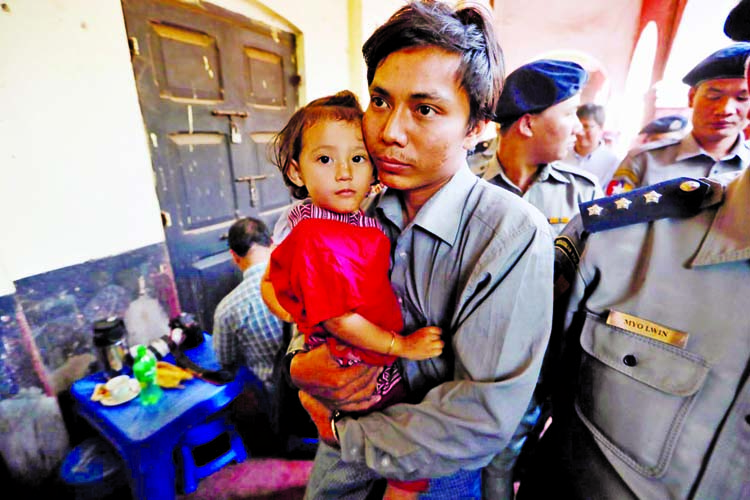
YANGON (Reuters) :
A district court in Myanmar rejected bail on Thursday for two Reuters journalists accused of violating the country’s colonial-era Official Secrets Act.
In proceedings, a lawyer for the two journalists told the court that documents police said were found in their possession when they were arrested contained information that was publicly available in newspaper reports.
Wa Lone, 31, and Kyaw Soe Oo, 27, had worked on Reuters coverage of a crisis in Rakhine state, where an army crackdown on insurgents that started on Aug. 25 has triggered the flight of nearly 690,000 Rohingya Muslims to neighboring Bangladesh, according to the United Nations.
The reporters were detained on Dec. 12 after they had been invited to meet police officers over dinner in Yangon. They have told relatives they were arrested almost immediately after being handed some documents at a restaurant by two officers they had not met before.
Reuters President and Editor-in-Chief Stephen J. Adler expressed disappointment that the reporters were denied bail and called for their prompt release.
“It has now been more than fifty days since they were arrested, and they should have the opportunity to be with their families as the hearings continue,” he said in a statement.
“We believe the court proceedings will demonstrate their innocence and Wa Lone and Kyaw Soe Oo will be able to return to their jobs reporting on events in Myanmar.”
Police Major Min Thant, one of the arresting officers, on Thursday submitted what he said were secret documents seized from the two reporters to the district court in Yangon that is hearing the case.
In response, Than Zaw Aung, a lawyer for the defense, submitted copies of several newspaper articles that he said showed the information in the documents was already public.
“They are filing the lawsuit saying these are secret things but I want to show this is not secret and the public already knew those things,” Than Zaw Aung told the court.
The court rejected the defense’s application for bail. Reading from the Official Secrets Act, Judge Ye Lwin said the alleged offence was “non-bailable”, without elaborating further.
At the last hearing on Jan. 23, another police officer had said he was told the reporters were arrested while they were walking along a road holding in their hands four official documents that included a listing of forces and weapons of a police battalion in the Maungdaw district of Rakhine state.
They were also found to have a report on an attack by Rohingya insurgents on a police outpost and a sketch of a map showing the post, as well as a copy of a report on the status of Rohingya villages following the military crackdown, according to a police document read out in court.
“After Aug. 25, the government explained to the media and diplomats about what happened in Maungdaw,” Than Zaw Aung said, arguing such information had already been published in newspaper reports.
Under cross-examination, police officer Min Thant also said that the location of the arrest in his testimony and the location in the case file were “slightly different”.
Min Thant said the reporters were arrested at a crossing in northern Yangon. But he said he changed the location of the arrest in the case file to outside the restaurant where the reporters say they had the meal with police officers because Kyaw Soe Oo, one of the two, had otherwise refused to sign a form recording the arrest and search. The two reporters were smiling and appeared in good spirits as they were brought handcuffed to the court from Yangon’s notorious Insein prison on Thursday. Wa Lone gave the “thumbs up” sign and Kyaw Soe Oo hugged his young daughter.
During a break in court proceedings, their families were allowed to spend some time with them.
The courtroom was packed with reporters and diplomats from the U.S., British, Canadian, Norwegian, Swedish, French and Danish embassies as well as United Nations and European Union officials.
The Danish embassy in Myanmar said its officers attended the previous hearing, where “many inconsistencies in the material put before the court to substantiate the charges were revealed”.
“We once again urge the immediate release of the two journalists,” the embassy said in a statement on Thursday. In a Twitter message, the Committee to Protect Journalists also reiterated its demand that the two reporters be set free.
The court hearing is to determine whether Wa Lone and Kyaw Soe Oo will face charges under the Official Secrets Act, which dates back to 1923 – when Myanmar, then known as Burma, was under British rule – and carries a maximum prison sentence of 14 years.
They have been accused under Section 3.1 © of the act, which covers entering prohibited places, and taking images or obtaining secret official documents that “might be or is intended to be, directly or indirectly, useful to an enemy”. The next hearing will be on Feb. 6.

